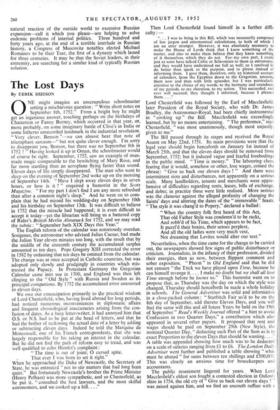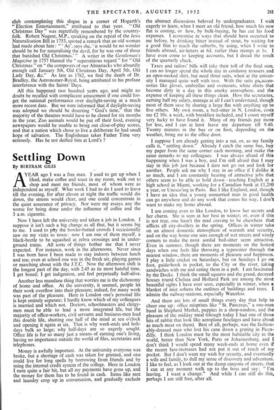The Lost Days
13) DEREK HUDSON 0 NE might imagine an unscrupulous schoolmaster setting a mischievous question : " Write short notes on September 8th, 1752." From a bright boy he might get an ingenious answer, touching perhaps on the birthdays of Chatterton or Fanny Burney, which occurred in that year, or, more. probably, on some imaginary battle of Clive's in India or some hitherto unrecorded landmark in the industrial revolution. " Very clever, Benson "—we can almost hear that note of triumphant sarcasm—" but not quite clever enough. I'm sorry to disappoint you, Benson, but there was no September 8th in 1752 ! " Having looked it up in Oman, the schoolmaster would of course be right. September, 1752, saw an example_of man- made magic comparable to the bewitching of Mary Rose, and far more startling than an aeroplane flying faster than sound. Eleven days of life simply disappeared. The man who went to sleep on the evening of September 2nd woke up on the morning of September 14th. " Have I slept away eleven days in seven hours, or how is it ? " enquired a humorist in the Scots Magazine. " For my part I don't find I am any more refreshed than after a common night's sleep." And he went on to com- plain that he had missed his wedding-day on September 10th and his birthday on September 13th. It was difficult to believe in 1752 that the miracle had happened; it is even difficult to accept it today—yet the librarian will bring us a battered copy of Rider's British Merlin Almanack for 1752, and we may read the rubric : " September hath XIX Days this Year."
The English reform of the calendar was notoriously overdue.
Sosigenes, the astronomer who advised Julius Caesar, had made the Julian Year eleven minutes too long, with the result that by the middle of the sixteenth century the accumulated surplus amounted to ten days. Pope Gregory XIII corrected the error in 1582 by ordaining that ten days be omitted from the calendar. The change was at once accepted in Catholic countries, but was adopted only slowly and grudgingly in countries which mis- trusted the Papacy. In Protestant Germany the Gregorian Calendar came into use in 1700, and England was then left clinging to the " Old Style " with Russia and Sweden as its principal companions. By 1752 the accumulated error amounted to eleven days.
We owe our emancipation primarily to the practical wisdom of Lord Chesterfield, who, having lived abroad for long periods, had noticed numerous inconveniences in diplomatic affairs and frequent chronological inaccuracies arising from the con- fusion of dates. As a busy letter...writer, it had annoyed him that O.S. or N.S. had to be put at the head of letters, and that he had the bother of reckoning the actual date of a letter by adding or subtracting eleven days. Indeed he told the Marquise de Monconseil, one of his French correspondents, that she was largely responsible for his taking an interest in the calendar. But he did not find the path of reform easy to tread, and was well qualified to echo Hamlet's complaint : " The time is out of joint; 0 cursed spite, . That ever I was born to set it right."
When he approached the Duke of Newcastle, the Secretary of State, he was entreated " not to stir matters that had long been quiet." But fortunately Newcastle's brother the Prime Minister (Henry Pelham) was more sympathetic, and so Chesterfield, as he put it, " consulted the best lawyers, and the most skilful astronomers, and we cooked up a bill.. .." Then Lord Chesterfield found himself in a further diffi- culty : -- ". . . I was to bring in this Bill, which wasnecessarily composed of law jargon and astronomical calculations, to both of which I am an utter stranger. However, it was absolutely necessary to make the House of Lords think that I knew something of the matter, and also to make them believe that they knew something of it themselves, which they do not. For• my own part, I could just as soon have talked Celtic or Sclavonian to them as astronomy, and they would have understood me full as well; so I resolved to do better than _ speak to the purpose, and to please instead of informing them. I gave them, therefore, only an historical account of calendars, from the Egyptian down to the Gregorian, amusing them now and then with little episodes; but I was particularly attentive to the choice of my words, to the harmony and roundness of my periods, to my elocution, to my action. This succeeded, and ever will succeed; they thought I informed, because I pleased them... ."
Lord Chesterfield was followed by the Earl of Macclesfield, later President of the. Royal Society, who with Dr. James Bradley, the Astronomer-Royal, had been chiefly instrumental in " cooking up " the Bill. Macclesfield was exceedingly learned, but by no means entertaining. " The preference," says Chesterfield, was most unanimously, though most unjustly, given to me."
The Bill passed through its stages and received the Royal Assent on May 22nd, 1751. Its main provisions were that the legal year should begin henceforth on January 1st instead of March 25th, and that the eleven days should be removed from September, 1752; but it induced vague and fearful forebodings in the public mind. " Time is money." The labouring class, fearing that it would, somehow or other, lose wages, coined the phrase: " Give us back our eleven days ! " And there were intermittent riots and disturbances, not apparently on a serious scale. Many landholders, tenants and merchants were appre- hensive of difficulties regarding rents, leases, bills of exchange, and debts; in practice these were little realised. More serious was the clamour against the alleged profanity of changing the Saints' days and altering the dates of the " immovable " feasts. " The style it was chang'd to Popery," declared a ballad : " When the country folk first heard of this Act, That old Father Style was condemn'd to be rackt, And robb'd of his Time, which appears to be fact, It puzzl'd their brains, their senses perplext, And all the old ladies were very much vext, Not dreaming that Levites would alter our text."
Nevertheless, when the time came for the change to be carried out, the newspapers showed few signs of public disturbance or criticism. Journalists, in the infancy of their profession, divided their energies, then as now, between flippant comment and sober exposition. " Pheon " in Old England said that he did not censure " the Trick we have played upon Time, because he can himself revenge it... . I make no doubt but we shall all lose Time enough before he looses us." This humorist went on to propose that, as Thursday was the day on which the style was changed, Thursday should henceforth be made a whole holiday in schools. The General Advertiser was solid and inforniative in a close-packed column : " Sturbitch Fair us'd to be on the 8th day of September, add thereto Eleven Days, and you will find the same will this and all future Years be held on the 19th of September." Read's Weekly Journal offered " a hint to avoid Confussion in two Quarter Days," a contribution which also appeared in several other papers. It proposed that rent and wages should be paid on September 29th (New Style), the nominal Quarter Day, " deducting such Part of the Sum as is in exact Proportion to the eleven Days that should be wanting.. _ . A table was appended showing how much was to be deducted on a scale of salaries ranging from £1 to £6. The London Daily Advertiser went further and published a table showing " what must be abated " for sums between ten shillings and £500,000.
This was clearly an anxious time fof housekeepers and accountants.
The public resentment lingered for years. When Lord Macclesfield's eldest son fought a contested election in Oxford- shire in 1754, the old cry of " Give us back our eleven days ! " was raised against him, and we find an uncouth ruffian with a club contemplating this slogan in a corner of Hogarth's " Election Entertainment," attributed to that year. " Old Christmas Day " was regretfully remembered by the country- folk. Robert Nugent, M.P., speaking on the repeal of the Jews Naturalisation Bill in 1753, quoted a remark that an old woman had made about him : " Ay', says she, it would be no wonder should he be for naturalising the devil, for he was one of those that. banished Old Christmas.' " A writer in the Gentleman's Magazine in 1757 blamed the " superstitious regard " for " Old Christmas " on " the composers of our Almanacks who absurdly enough call January 5th, Old Christmas Day, April 5th, Old Lady Day, &c." As late as 1762, we find the death of Dr. Bradley, the Astronomer-Royal, being attributed to his profane interference with the Saints' Days.
All this happened two hundred years ago, and might no doubt be recalled with complacent amusement if one could for- get the national performance over daylight-saving at a much more recent date. But we were informed that if daylight-saving was adopted we should be deserting " God's time," that the majority of the theatres would have to be closed for six months in the year, Zoo animals would be put off their food, evening newspapers would be unable to bring out close-of-play scores, and that a nation which chose to live a deliberate lie had small hope of salvation. The Englishman takes Father Time very seriously. Has he not deified him at Lord's ?



































 Previous page
Previous page